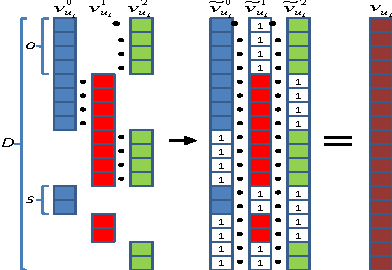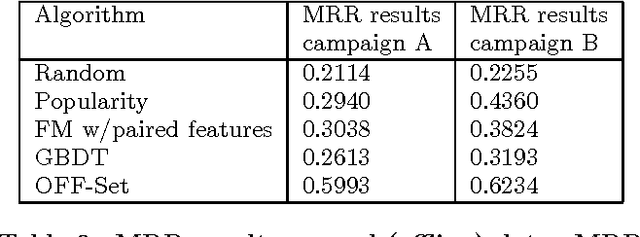Michal Aharon
Soft Frequency Capping for Improved Ad Click Prediction in Yahoo Gemini Native
Dec 08, 2023Abstract:Yahoo's native advertising (also known as Gemini native) serves billions of ad impressions daily, reaching a yearly run-rate of many hundred of millions USD. Driving the Gemini native models that are used to predict both click probability (pCTR) and conversion probability (pCONV) is OFFSET - a feature enhanced collaborative-filtering (CF) based event prediction algorithm. \offset is a one-pass algorithm that updates its model for every new batch of logged data using a stochastic gradient descent (SGD) based approach. Since OFFSET represents its users by their features (i.e., user-less model) due to sparsity issues, rule based hard frequency capping (HFC) is used to control the number of times a certain user views a certain ad. Moreover, related statistics reveal that user ad fatigue results in a dramatic drop in click through rate (CTR). Therefore, to improve click prediction accuracy, we propose a soft frequency capping (SFC) approach, where the frequency feature is incorporated into the OFFSET model as a user-ad feature and its weight vector is learned via logistic regression as part of OFFSET training. Online evaluation of the soft frequency capping algorithm via bucket testing showed a significant 7.3% revenue lift. Since then, the frequency feature enhanced model has been pushed to production serving all traffic, and is generating a hefty revenue lift for Yahoo Gemini native. We also report related statistics that reveal, among other things, that while users' gender does not affect ad fatigue, the latter seems to increase with users' age.
OFF-Set: One-pass Factorization of Feature Sets for Online Recommendation in Persistent Cold Start Settings
Aug 08, 2013



Abstract:One of the most challenging recommendation tasks is recommending to a new, previously unseen user. This is known as the 'user cold start' problem. Assuming certain features or attributes of users are known, one approach for handling new users is to initially model them based on their features. Motivated by an ad targeting application, this paper describes an extreme online recommendation setting where the cold start problem is perpetual. Every user is encountered by the system just once, receives a recommendation, and either consumes or ignores it, registering a binary reward. We introduce One-pass Factorization of Feature Sets, OFF-Set, a novel recommendation algorithm based on Latent Factor analysis, which models users by mapping their features to a latent space. Furthermore, OFF-Set is able to model non-linear interactions between pairs of features. OFF-Set is designed for purely online recommendation, performing lightweight updates of its model per each recommendation-reward observation. We evaluate OFF-Set against several state of the art baselines, and demonstrate its superiority on real ad-targeting data.
 Add to Chrome
Add to Chrome Add to Firefox
Add to Firefox Add to Edge
Add to Edge